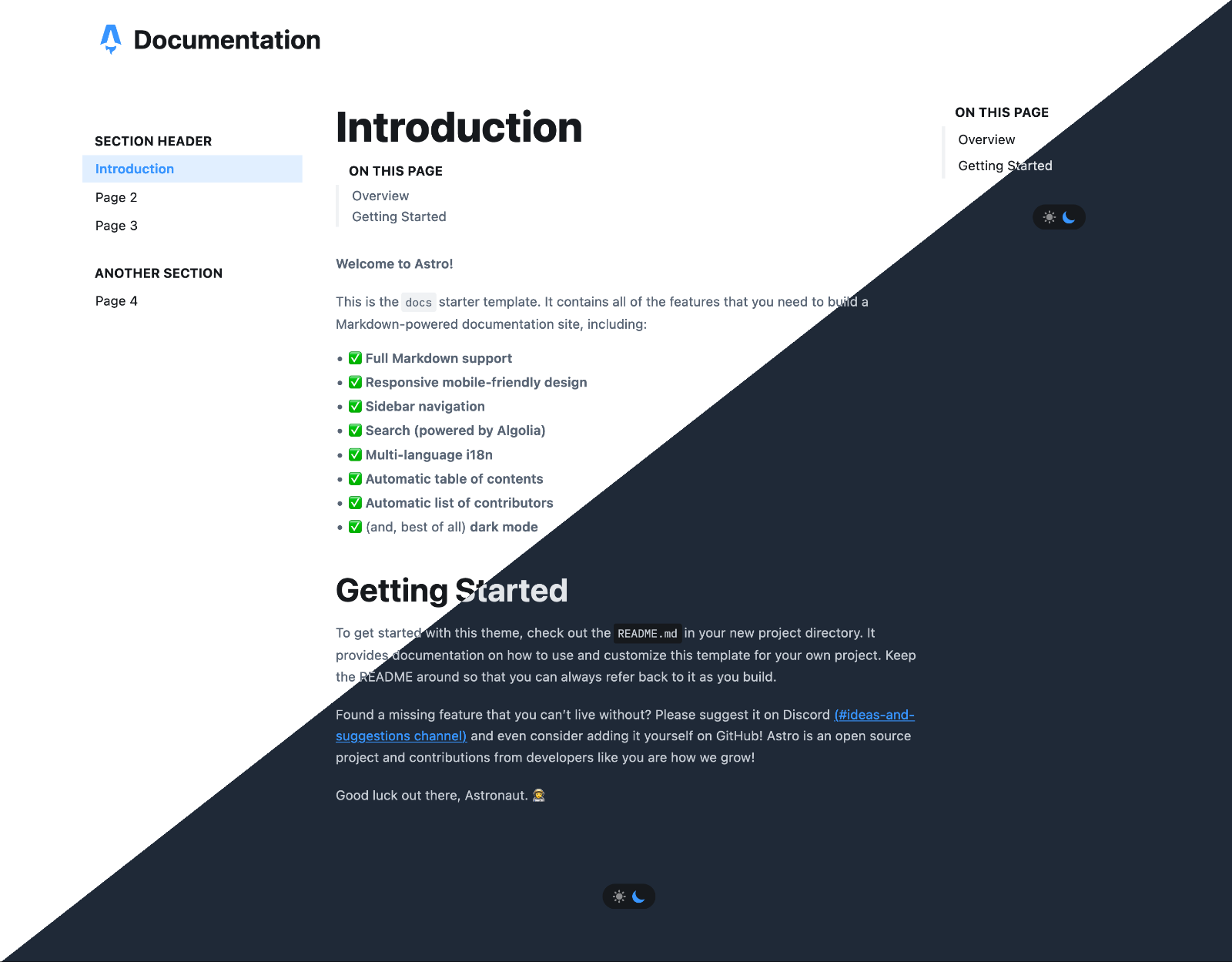This is a “librarian” repository to act as a conveniently catalogued and helpfully organizationally presented archival virtual “Library” (Quenya=“Parmassë”) of GitHub code repositories that seem idiosyncratically interesting to me or worthy of greater attention… It also makes a nice prototype for deploying an Astro site on GitHub Pages.
npm create astro@latest -- --template docs- ✅ Full Markdown support
- ✅ Responsive mobile-friendly design
- ✅ Sidebar navigation
- ✅ Search (powered by Algolia)
- ✅ Multi-language i18n
- ✅ Automatic table of contents
- ✅ Automatic list of contributors
- ✅ (and, best of all) dark mode
All commands are run from the root of the project, from a terminal:
| Command | Action |
|---|---|
npm install |
Installs dependencies |
npm run dev |
Starts local dev server at localhost:3000 |
npm run build |
Build your production site to ./dist/ |
npm run preview |
Preview your build locally, before deploying |
npm run astro ... |
Run CLI commands like astro add, astro check |
npm run astro --help |
Get help using the Astro CLI |
For deployment to production, check out the Deploy an Astro Website guide.
Check out the documentation or the Discord server.
src/config.tscontains several data objects that describe metadata about your site like title, description, default language, and Open Graph details. You can customize these to match your project.
The theme's look and feel is controlled by a few key variables that you can customize yourself. You'll find them in the
src/styles/theme.cssCSS file. For example, the theme uses a "cool blue" accent color by default. To customize this for your project, change the--theme-accentvariable to whatever color you'd like:
/* src/styles/theme.css */
:root {
color-scheme: light;
- --theme-accent: hsla(var(--color-blue), 1);
+ --theme-accent: hsla(var(--color-red), 1); /* or: hsla(#FF0000, 1); */Astro uses frontmatter in Markdown pages to choose layouts and pass properties to those layouts. If you are using the default layout, you can customize the page in many different ways to optimize SEO and other things. For example, you could use the
titleanddescriptionproperties to set the document title, meta title, meta description, and Open Graph description.
---
title: Example title
description: Really cool docs example that uses Astro
layout: ../../layouts/MainLayout.astro
---
# Page content...- For more SEO related properties, look at
src/components/HeadSEO.astro
Sidebar navigation is controlled by the
SIDEBARvariable insrc/config.tsfile. You can customize the sidebar by modifying this object. For example:
export const SIDEBAR = {
en: [
{ text: "Section Header", header: true },
{ text: "Introduction", link: "en/introduction" },
{ text: "Page 2", link: "en/page-2" },
{ text: "Page 3", link: "en/page-3" },
{ text: "Another Section", header: true },
{ text: "Page 4", link: "en/page-4" },
],
};- Note the top-level
enkey: This is needed for multi-language support. You can change it to whatever language you'd like, or add new languages as you go. More details on this below.
The Astro docs template supports multiple langauges. The default theme only shows
endocumentation, but you can enable multi-language support. To add a new language to your project, you'll want to extend the currentsrc/pages/[lang]/...layout:
📂 src/pages
┣ 📂 en
┃ ┣ 📜 page-1.md
┃ ┣ 📜 page-2.md
┃ ┣ 📜 page-3.astro
+ ┣ 📂 es
+ ┃ ┣ 📜 page-1.md
+ ┃ ┣ 📜 page-2.md
+ ┃ ┣ 📜 page-3.astro- This would require adding the new language name to the
KNOWN_LANGUAGESmap in yoursrc/config.tsfile. This will enable your new language switcher in the site header.
// src/config.ts
export const KNOWN_LANGUAGES = {
English: 'en',
+ Spanish: 'es',
};- Last step: you'll need to add a new entry to your sidebar, to create the table of contents for that language. While duplicating every page might not sound ideal to everyone, this extra control allows you to create entirely custom content for every language.
Make sure the sidebar
linkvalue points to the correct language!
// src/config.ts
export const SIDEBAR = {
en: [
{ text: 'Section Header', header: true, },
{ text: 'Introduction', link: 'en/introduction' },
// ...
],
+ es: [
+ { text: 'Encabezado de sección', header: true, },
+ { text: 'Introducción', link: 'es/introduction' },
+ // ...
+ ],
};
// ...- If you plan to use Spanish as the the default language, you would simply need to modify the redirect path in
src/pages/index.astro:
<script>
- window.location.pathname = `/en/introduction`;
+ window.location.pathname = `/es/introduction`;
</script>- Or you could also remove the above script and write a landing page in Spanish instead.
- Not all projects need (or can support) multiple languages. You can continue to use this theme without ever adding a second language.
- If that single language is not English, you can just replace
enin directory layouts and configurations with the preferred language.
- Algolia offers a free service to qualified open source projects called DocSearch. If you are accepted to the DocSearch program, provide your API Key&index name in
src/config.tsand a search box will automatically appear in your site header. - To remove Algolia’s search and replace it with your own, check out the
src/components/Header.astrocomponent to see where the component is added.

